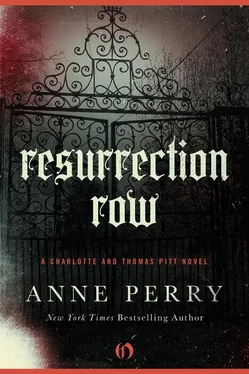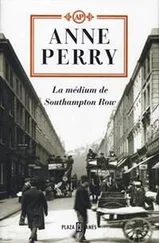Anne Perry - Resurrection Row
Здесь есть возможность читать онлайн «Anne Perry - Resurrection Row» весь текст электронной книги совершенно бесплатно (целиком полную версию без сокращений). В некоторых случаях можно слушать аудио, скачать через торрент в формате fb2 и присутствует краткое содержание. Жанр: Исторический детектив, на английском языке. Описание произведения, (предисловие) а так же отзывы посетителей доступны на портале библиотеки ЛибКат.
- Название:Resurrection Row
- Автор:
- Жанр:
- Год:неизвестен
- ISBN:нет данных
- Рейтинг книги:5 / 5. Голосов: 1
-
Избранное:Добавить в избранное
- Отзывы:
-
Ваша оценка:
- 100
- 1
- 2
- 3
- 4
- 5
Resurrection Row: краткое содержание, описание и аннотация
Предлагаем к чтению аннотацию, описание, краткое содержание или предисловие (зависит от того, что написал сам автор книги «Resurrection Row»). Если вы не нашли необходимую информацию о книге — напишите в комментариях, мы постараемся отыскать её.
Resurrection Row — читать онлайн бесплатно полную книгу (весь текст) целиком
Ниже представлен текст книги, разбитый по страницам. Система сохранения места последней прочитанной страницы, позволяет с удобством читать онлайн бесплатно книгу «Resurrection Row», без необходимости каждый раз заново искать на чём Вы остановились. Поставьте закладку, и сможете в любой момент перейти на страницу, на которой закончили чтение.
Интервал:
Закладка:
It was something of an understatement. It had taken Dominic three years to get himself elected as a member, and he disliked having his achievement taken so lightly.
“Rather more than comfortable, I would have said.” His voice had a slight edge.
“It’s all relative.” Carlisle took another forkful of goose. “I dare say at Windsor they dine better.” He swallowed and took a sip of wine. “Then, on the other hand, there are thousands in the tenements and rookeries within a mile of here who find boiled rats a luxury-”
Dominic choked on his goose and gagged. The room swum before him, and for a moment he thought he was going to disgrace himself by being sick at the table. It took him several seconds to compose himself, wipe his mouth with his napkin, and look up to meet Carlisle’s curious eyes. He could not think what to say to him. The man was preposterous.
“Sorry,” Carlisle said lightly. “Shouldn’t spoil a good meal by talking politics.” He smiled.
Dominic was completely unguarded. “P-politics?” he stammered.
“Most distasteful,” Carlisle agreed. “Much pleasanter to talk about horseracing, or fashion. I see your friend Fleetwood has adopted that new cut of jacket. Rather flattering, don’t you think? I shall have to see if I can get my tailor to do something of the sort.”
“What in hell are you talking about?” Dominic demanded. “You said ‘rats.’ I heard you!”
“Perhaps I should have said ‘workhouses.’ ” Carlisle chose the words carefully. “Or pauper-children laws. So difficult to know what to do. Whole family in the workhouse, children in with the idle or vagrant, no education, work from waking to sleeping-but better than starvation, which is the alternative, or freezing to death. Have you seen the sort of people that get into the workhouses? Imagine how they affect a child of four or five years old. Seen the disease, the ventilation, the food?”
Dominic remembered his own childhood: a nurse, recalled only hazily, mixed in his mind with his mother, a governess, then school-with long summer holidays; rice pudding, which he loathed, and afternoon teas with jam, especially raspberry jam. He remembered songs round the piano, making snowballs, playing cricket in the sun, stealing plums, breaking windows, and receiving canings for insolence.
“That’s ridiculous!” he said sharply. “Workhouses are supposed to be temporary relief for those who cannot find legitimate work for themselves. It is a charitable charge on the parish.”
“Oh, very charitable.” Carlisle’s eyes were very bright, watching Dominic’s face. “Children of three or four years old in with the flotsam of society, learning hopelessness from the cradle onwards; those that don’t die of disease from rotten food, poor ventilation, cross infection-”
“Well, it should be stopped!” Dominic said flatly. “Clean the places up!”
“Of course,” Carlisle agreed. “But then what? If they don’t go to schools of some sort, they never learn even to read or write. How can they ever get out of the circle of vagrant to workhouse, and back again? What can they do? Sweep crossings summer and winter? Walk the streets as long as their looks last and then turn to the sweatshops? Do you know how much a seamstress earns for sewing a shirt, seams, cuffs, collars, buttonholes, and four rows of stitching down the front, all complete?”
Dominic thought of the prices of his own shirts. “Two shillings?” He hazarded a guess, a little on the mean side, but then Carlisle had suggested as much.
“How extravagant!” Carlisle said bitterly. “She would have to sew ten for that!”
“But how do they live?” The goose was going cold on Dominic’s plate.
Carlisle turned his hands up. “Most of them are prostitutes at night, to feed their children; and then when the children are old enough, they work as well-or else it is all back to the workhouse, and there’s your cycle again!”
“But what about their husbands? Some of them have husbands, surely?” Dominic was still looking for rationality, something sane to explain it.
“Oh, yes, some of them do,” said Carlisle. “But it’s cheaper to employ a woman than a man; you don’t have to pay her much, so the men don’t get the work.”
“That’s-” Dominic searched for a word and failed to find one. He sat staring at Carlisle over the congealing goose.
“Politics,” Carlisle murmured, picking up his fork again. “And education.”
“How can you eat that?” Dominic demanded; it was repulsive to him now, an indecency, if what Carlisle said was true.
Carlisle put it into his mouth and spoke round it. “Because if I were not to eat every time I think of sweated labor, uneducated children, the indigent, sick, filthy, or destitute, I should never eat at all-and what purpose would that serve? Parliament. I ran for it once and failed. My ideas were remarkably unpopular with those who have the vote. Sweated labor doesn’t vote, you know-female, mostly, too young, and too poor. Now I have to try the back door- House of Lords, people like St. Jermyn, with his bill, and your friend Fleetwood. They don’t give a damn about the poor, probably never really seen any, but an eye to a cause-great thing, a cause.”
Dominic pushed his plate away. If this were true, not a piece of melodramatic luncheon conversation designed to shock, then something ought to be done by people like Fleetwood. Carlisle was perfectly right.
He drank the end of the wine and was glad of its clean bite; he needed to wash his mouth out after the taste that had been on his tongue. He wished to God he had never seen Somerset Carlisle; the man was uncouth to invite him to a meal and then discuss such things. They were thoughts that were impossible to get rid of.
Pitt’s superiors had meantime directed his attention to a case of embezzlement in a local firm, and he was returning to the police station after a day of questioning clerks and reading endless files he did not understand when he was met at the door by a wide-eyed constable. Pitt was cold and tired, and his feet were wet. All he wanted was to go home and eat something hot, then sit by the fire with Charlotte and talk about anything, as long as it was removed from crime.
“What is it?” he said wearily; the man was practically wringing his hands with anxiety and pent-up apprehension.
“It’s happened again!” he said hoarsely.
Pitt knew, but he put off the moment. “What has?”
“Corpses, sir. There’s been another corpse. I mean one dug up like, not a new one.”
Pitt shut his eyes. “Where?”
“In the park, sir. St. Bartholomew’s Green, sir. Not really a park, just a stretch o’ longish grass with a few trees and a couple o’ seats. Found on one o’ the seats, ’e was, sitting up there like Jackie, bold as you like-but dead, o’ course, stone dead. And ’as been for a while, I’d say.”
“What does he look like?” Pitt asked.
The constable screwed up his face.
“ ’Orrible, sir, downright ’orrible.”
“Naturally!” Pitt snapped; his patience was worn thin to transparency. “But was he young or old, tall or short; come on, man! You’re a policeman, not a penny novelist! What kind of a description is ‘’orrible’?”
The constable blushed crimson. “ ’E was tall and corpulent, sir, with black ’air and black whiskers, sir. And ’e was dressed in an ’and-me-down sort o’ coat; didn’t fit ’im none too good, not like a gentleman’s would, sir.”
“Thank you,” Pitt said ungraciously. “Where is he?”
“In the morgue, sir.”
Pitt turned on his heel and went out again. He walked the few blocks to the morgue, head bent against the rain, mind turning over furiously every conceivable answer to the disgusting and apparently pointless happenings. Who on earth was going around digging up random corpses-and above all, why?
Читать дальшеИнтервал:
Закладка:
Похожие книги на «Resurrection Row»
Представляем Вашему вниманию похожие книги на «Resurrection Row» списком для выбора. Мы отобрали схожую по названию и смыслу литературу в надежде предоставить читателям больше вариантов отыскать новые, интересные, ещё непрочитанные произведения.
Обсуждение, отзывы о книге «Resurrection Row» и просто собственные мнения читателей. Оставьте ваши комментарии, напишите, что Вы думаете о произведении, его смысле или главных героях. Укажите что конкретно понравилось, а что нет, и почему Вы так считаете.












